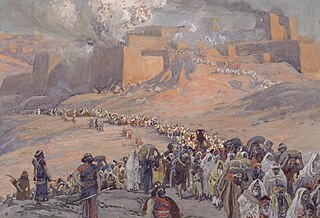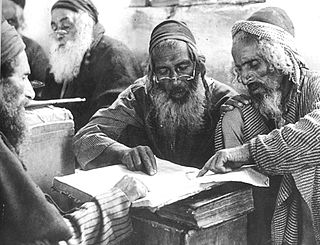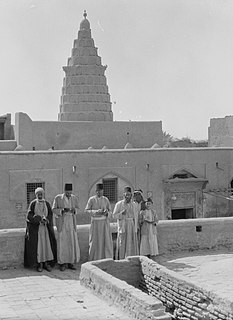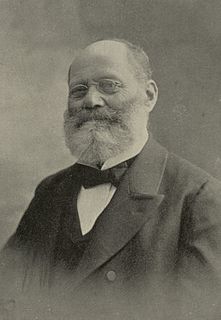Related Research Articles
The Kingdom of Israel and the Kingdom of Judah were two related Israelite kingdoms from the Iron Age period of the ancient Southern Levant. After an emergent and large polity was suddenly formed based on the Gibeon-Gibeah plateau and destroyed by Shoshenq I in the first half of 10th century BCE, a return to small city-states was prevalent in the Southern Levant, but between 950 and 900 BCE another large polity emerged in the northern highlands with its capital eventually at Tirzah, that can be considered the precursor of the Kingdom of Israel. The Kingdom was consolidated as an important regional power by the first half of the 9th century BCE, before falling to the Neo-Assyrian Empire in 722 BCE.

The Babylonian captivity or Babylonian exile is the period in Jewish history during which a large number of Judeans from the ancient Kingdom of Judah were captives in Babylon, the capital city of the Neo-Babylonian Empire, following their defeat in the Jewish–Babylonian War and the destruction of Solomon's Temple in Jerusalem. The event is described in the Hebrew Bible, and its historicity is supported by archaeological and non-biblical evidence.

Yemenite Hebrew, also referred to as Temani Hebrew, is the pronunciation system for Hebrew traditionally used by Yemenite Jews. Yemenite Jews brought their language to Israel through immigration. Their first organized immigration to the region began in 1882.
The Jewish Neo-Aramaic dialect of Zakho is a dialect of Northeastern Neo-Aramaic originally spoken by Jews in Zakho, Iraq. Following the exodus of Jews from the Muslim lands, most speakers now live in Israel, principally Jerusalem and surrounding villages.
Barzani Jewish Neo-Aramaic is a modern Jewish Aramaic language, often called Neo-Aramaic or Judeo-Aramaic. It was originally spoken in three villages near Aqrah in Iraqi Kurdistan. The native name of the language is Lishanid Janan, which means 'our language', and is similar to names used by other Jewish Neo-Aramaic dialects .

Judaeo-Aramaic languages represent a group of Hebrew-influenced Aramaic and Neo-Aramaic languages.

Uri Zvi Greenberg was an acclaimed Israeli poet, journalist and politician who wrote in Yiddish and Hebrew. Widely regarded among the greatest poets in the country's history, he was awarded the Israel Prize in 1957 and the Bialik Prize in 1947, 1954 and 1977, all for his contributions to fine literature. Following Israeli independence in 1948, he also served in the first Knesset as a member of Menachem Begin's Herut Party. Greenberg's Revisionist orientation had an important influence on both his writings and his politics.

The history of the Jews in Iraq is documented from the time of the Babylonian captivity c. 586 BC. Iraqi Jews constitute one of the world's oldest and most historically significant Jewish communities.

The Jews of Kurdistan are the Mizrahi Jewish communities native to the geographic region of Kurdistan, roughly covering parts of northwestern Iran, northern Iraq, northeastern Syria and southeastern Turkey. Kurdish Jews lived as closed ethnic communities until they were expelled from Arab and Muslim states from the 1940s–1950s onward. The community largely speaks Judeo-Aramaic and Kurdish languages, with the Kurmanji dialect of Iraqi Kurdistan being the most prevalent. As Kurdish Jews natively adhere to Judaism and originate from the Middle East, Mizrahi Hebrew is used for liturgy. Many Kurdish Jews, especially the ones who hail from Iraq, went through a Sephardic Jewish blending during the 18th century.

Jewish literature includes works written by Jews on Jewish themes, literary works written in Jewish languages on various themes, and literary works in any language written by Jewish writers. Ancient Jewish literature includes Biblical literature and rabbinic literature. Medieval Jewish literature includes not only rabbinic literature but also ethical literature, philosophical literature, mystical literature, various other forms of prose including history and fiction, and various forms of poetry of both religious and secular varieties. The production of Jewish literature has flowered with the modern emergence of secular Jewish culture. Modern Jewish literature has included Yiddish literature, Judeo-Tat literature, Ladino literature, Hebrew literature, and Jewish American literature.
Yona Sabar is a Kurdistani Jewish scholar, linguist and researcher. He is professor emeritus of Hebrew at the University of California, Los Angeles. He is a native speaker of Northeastern Neo-Aramaic and has published more than 90 research articles about Jewish Neo-Aramaic and the folklore of the Jews of Kurdistan.

Michael Levi Rodkinson (1845–1904) was an American publisher, known for being the first to translate the Babylonian Talmud to English.
Laws and customs of the Land of Israel in Judaism are those Jewish laws that apply only to the Land of Israel. These include the commandments dependent on the Land, as well as various customs.

Rosh HaShanah, literally meaning "head [of] the year", is the Jewish New Year. The biblical name for this holiday is Yom Teruah, literally "day of shouting or blasting." It is the first of the Jewish High Holy Days, as specified by Leviticus 23:23–25, that occur in the late summer/early autumn of the Northern Hemisphere. The High Holy Days comprises both Rosh HaShanah and Yom Kippur.

Jews or Jewish people are an ethnoreligious group and nation originating from the Israelites and Hebrews of historical Israel and Judah. Jewish ethnicity, nationhood, and religion are strongly interrelated, as Judaism is the ethnic religion of the Jewish people, although its observance varies from strict to none.
The following outline is provided as an overview of and topical guide to Judaism:
Zev Garber is an American academic. He is Professor Emeritus and Chair of Jewish Studies at Los Angeles Valley College, and the editor of Shofar, a peer-reviewed academic journal of Jewish Studies. He is the former president of the National Association of Professors of Hebrew. He was the subject of a Festschrift in 2009.
Rabbi Shelomo Bekhor Ḥutzin, also known as the Rashbaḥ, was an Baghdadi Jewish posek, liturgical poet, journalist, translator, and publisher.
Amram Qorah was the last Chief Rabbi in Yemen, assuming this role in 1934, after the death of Rabbi Yihya al-Abyadh, Resh Methivta, and which role he held for approximately two years. He is the author of the book, Sa'arat Teman, published post-mortem by the author's son, a book that documents the history of the Jews of Yemen and their culture for a little over 250 years, from the Mawza exile to the mass-immigration of Yemenite Jews to Israel in the mid-20th century.

Babylonian Jewry Heritage Center is a museum and research center in Or Yehuda, Israel.
References
- 1 2 3 Tugend, Tom (March 24, 2003). "Iraqi Jews in L.A.: War is necessary evil". Jewish Telegraphic Agency. Retrieved May 28, 2016.
- 1 2 Tugend, Tom (March 27, 2003). "Anxiety and Hope". The Jewish Journal of Greater Los Angeles. Retrieved May 28, 2016.
- 1 2 Abramson, Glenda (2004). Encyclopedia of Modern Jewish Culture. New York: Routledge. ISBN 9780415298131. OCLC 57470923.
- ↑ Modes of organization in modern Hebrew free verse. WorldCat. OCLC 315799338 . Retrieved May 28, 2016.
- 1 2 3 4 Alcalay, Ammiel (1996). Keys to the Garden: New Israeli Writing. San Francisco, California: City Lights Books. p. 286. ISBN 9780872863088. OCLC 32859679.
- ↑ "Lev Hakak". The Huffington Post. Retrieved May 28, 2016.
- 1 2 "Lev Hakak". Purdue University Press. Retrieved May 28, 2016.
- ↑ Sabar, Yona (Fall 2012). "Reviewed Work: The Emergence of Modern Hebrew Creativity in Babylon, 1735–1950 by Lev Hakak". Shofar . 31 (1): 147. doi:10.1353/sho.2012.0126. JSTOR 10.5703/shofar.31.1.147. S2CID 171082133.
- ↑ Minutes of the May 31, 2016 special meeting of the Beverly Hills city council
- ↑ "Councilmember William W. Brien Stepping Down May 2016". Canyon News. April 13, 2016.
1. Tugend, Tom (March 24, 2003). "Iraqi Jews in L.A.: War is necessary evil". Jewish Telegraphic Agency. Retrieved May 28, 2016. 2. Tugend, Tom (March 27, 2003). "Anxiety and Hope". The Jewish Journal of Greater Los Angeles. Retrieved May 28, 2016. 3. Abramson, Glenda (2004). Encyclopedia of Modern Jewish Culture. New York: Routledge. ISBN 9780415298131. OCLC 57470923. 4. "Modes of organization in modern Hebrew free verse". WorldCat. Retrieved May 28, 2016. 5. Alcalay, Ammiel (1996). Keys to the Garden: New Israeli Writing. San Francisco, California: City Lights Books. p. 286. ISBN 9780872863088. OCLC 32859679. 6. "Lev Hakak". The Huffington Post. Retrieved May 28, 2016. 7. "Lev Hakak". Purdue University Press. Retrieved May 28, 2016. 8. Sabar, Yona (Fall 2012). "Reviewed Work: The Emergence of Modern Hebrew Creativity in Babylon, 1735–1950 by Lev Hakak". Shofar. 31 (1): 147. JSTOR 10.5703/shofar.31.1.147. (Registration required (help)). 9. Minutes of the May 31, 2016 special meeting of the Beverly Hills city council 10. "Councilmember William W. Brien Stepping Down May 2016". Canyon News. April 13, 2016. 11. Alex Raskin, 'Stranger Among Brothers', Los Angeles Times, April 12, 1988. 12. Howard, Kaplan. 'Strangers', A Novel of Dual Identities. Jewish Journal, April 28, 1988. 13. Arieh Winwman, 'Im Eshkahekh". Hebrew STudies, 23 (1982), pp. 265–266. 14. Esther Fuchs, “Equivocal Dreams: Studies in Modern Hebrew Literature”, Shofar, Purdue University Press, Volume 15, Number 3, Spring 1997, pp. 111–114. 15. Shmuel Moreh. Lev Hakak - a Baghdad Born Scholar, Poet and Writer. In Yahadut Bavel: A Periodical for The Research of the History and Culture of Babylonian Jews, No. 2, Babylonian Jewry Heritage Center, Hebrew pp. 1117–140; English pp. 41–46. 16. Shmuel Moreh, The Literature of Babylonian Jews in the Work of Lev Hakak. Pe'amim No. 130, Yad Ben Zvi, 2012, pp. 233–244. 17. Yair Mazor, “The Budding of Modern Hebrew Creativity in Babylon: The Collected Essays of Rabbi Shelomo Bekhor Hutsin”, by Lev Hakak". Shofar, An Intredisciplinary Journal of Jewish Studies, Vol. 25, No. 3, 2007, pp. 207–208. 18. Yona Sabar, “Rewriting Literary History”. The Jerusalem Post, June 3, 2005. 19. Yair Mazor, “The Collected Essays of Rabbi Shelomo Bekhor Hutsin, by Lev Hakak”. Shofar, An Interdisciplinary Journal of Jewish Studies, Vol. 25, No. 3, 2007, pp. 207–208. 20. Rachel Simon, “Hakak, Lev: The Emergence of Modern Hebrew Creativity in Babylon, 1735-1950.” Association of Jewish Librarian (AJL), February/March 2010, p. 35. 21. Sabar, Yona. The Emergence of Modern Hebrew Creativity in Babylon, 1735-1950. Shofar, Fall 2012, Vol. 31, No.1, P. 147. 22. Rina Donchin, Modern Hebrew Literature Made into Films by Lev Hakak. National Association of Professors of Hebrew, Vol. 13 (2010), pp. 169–170 23. Professor Lev Hakak on The Filming of Israeli Literature". The Jewish Post, New York State 31 Monthly Jewish Newspaper, September 2003 24. Itamar Drori. Two Books by Lev Hakak: Reading Modern Hebrew Poetry and Prose, 336 pp; Song of the Whitewasher, 88 pp. Hebrew Higher Education, N0. 20, 2018, pp. 1–7. 25. Kritz, Ori. Hakak, Lev. In the Encyclopedia of Jews in the Islamic World. Brill